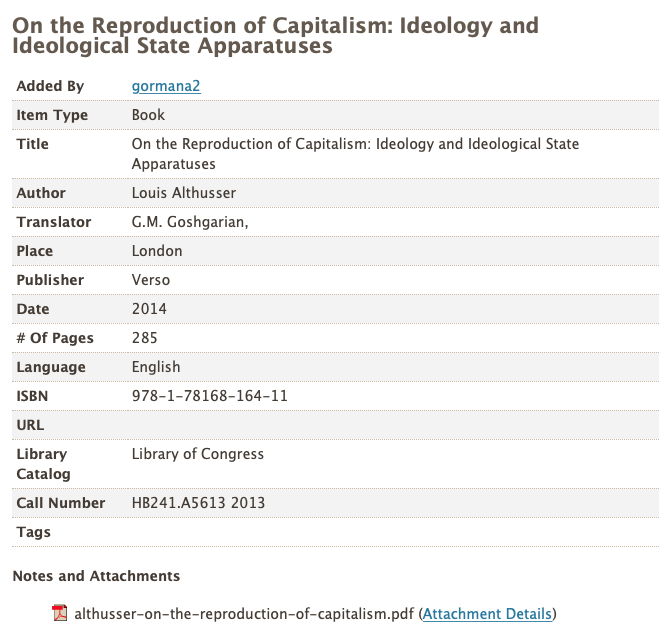The MARXdown Style Guide for Annotations
MARXdown reading editions provide a space for people to publicly collaborate, pool resources, and engage in discussion with other readers around the world. We hope to encourage readers from all sorts of backgrounds to join us, including scholars of Marxism and academic researchers, study groups in unions, research collectives, and political clubs, students, and individuals who are interested in learning more about Marx’s theory of the capitalist mode of production.
To ensure that MARXdown is an accessible and user-friendly resource, we have compiled a few style guidelines to help readers get the most out of utilizing and contributing annotations to an edition.
Suggested Guidelines
-
Keep MARXdown tidy: Please delete any fragmentary annotations you might produce.
-
Annotations are user-generated, and only you can edit or delete your annotations, tags, links, and citations. Please review your work and take the time to get rid of any clutter.
-
Try to ensure that your links and tags function correctly, and go over your citations to maintain a consistent style and to provide adequate bibliographic information for other users to track down the sources you point them to.
-
-
Using Tags: Tags can be a useful and powerful tool.
-
Tags can make public groups. If you’re part of a reading group, you can group other members’ annotations by adding a shared tag in each of your annotations. For example, CMRG-CMU is the tag members of the Contemporary Marxist Reading Group at Carnegie Mellon University are using to track our conversation.
-
Tags let you group topics, authors, or keywords (e.g. “Primitive Accumulation,” “Money,” or “Lukàcs”). Tags are even more powerful if you seek to maintain a consistent style with respect to capitalization, spelling, and diacritical marks (accents, etc.).
-
Tags let you explore. By using a combination of tags that direct you to your reading group and to keywords, you’ll be able to follow along with annotations generated by other members of your reading group and explore annotations on particular topics of interest to you generated by all other readers.
-
Keep tags consistent. When you use the tagging feature, suggestions will appear in a dropdown list. Please be attentive to the differences between British and American spellings, e.g. labour and labor. If both are in use, use both to connect topics! Otherwise, American usage is generally preferred.
-
-
Annotations and Page Notes: Annotations will be located in a specific passage of text, while Page Notes allow you to comment on the section as a whole.
-
Add Links: MARXdown’s annotation composer window allows you to add hyperlinks to off-site resources. Just click the link icon in the composer and paste the URL into the parentheses. Images will appear directly in the annotations. You can also turn any word or phrase in your annotation into a hyperlink.
-
Use Zotero to link, share, and download PDFs: Zotero is an independent open-source citation management tool that allows us to link to PDF resources through MARXdown’s group library while preserving bibliographic information.
-
Once you’ve created a Zotero account and requested access to the MARXdown Group Library, you can upload, share, and download PDFs. When you upload or drag-and-drop resources to the MARXdown library, make sure to provide detailed bibliographic information.
-
To link to PDFs in Zotero from hypothes.is, create a link in your annotation and copy and paste the URL of the item in the MARXdown library to the link. Users will be able to see the full bibliographic information and download a copy of the PDF to find your citation or keep to read later.
Important: Please link to the entry in the Zotero library. Do not link to the PDF directly. This will produce a dead link. The Zotero entry you want to link to looks like this:

-
-
Citations: In order to facilitate the exchange of ideas and the sharing of resources, we ask that you take the time to cite any outside texts you may refer to in your annotations in Chicago Style.
-
Please aim to provide the fullest citation information available so that other users can seek out the source. In a pinch, the name and title of the work will suffice but ideally include the full citation information for a print source, which includes:
- The author’s full name or last name
- The title of the article or chapter in an edited volume in “quotation marks”
- The title of the book, edited volume, or journal in italics
- The name of the editor and translator, when relevant
- The publisher and year of publication of books and edited volumes OR the volume number, issue number, and date of publication of the journal in which the article appeared.
And finally,
- the page number.
If you provide a link to a PDF on Zotero or to an online article or webpage, just provide the author’s name and the title. When sharing a PDF, please include a page number.
You can also refer to a whole text in your annotation by author and title with the preface cf. (confer) or cp. (compare).
For example: cf. Valentino Gerratana. “Althusser and Stalinism.” New Left Review 101-102, January-April 1977.
-
-
Citing Print Editions of Marx: The standard print edition of Capital that most people use is the Penguin Classics edition translated by Ben Fowkes.
-
For references to Capital Vols. I-III as well as to Marx’s Grundrisse please refer to page numbers in the Penguin Classics edition.
-
For miscellaneous texts by Marx, please provide full citation information.
-